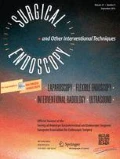Abstract
Background
Recently, the adequacy of endoscopy training in general surgery residency programs has been questioned. Efforts to improve resident endoscopic training and to judge competency are ongoing but not well studied. We assessed resident performance using two assessment tools in colonoscopy in a general surgery residency program.
Methods
Prospectively collected data were reviewed from consecutive colonoscopies by a single surgeon: September 2008 to June 2011. Colonoscopies performed without residents were excluded. Data included patient demographics, procedural data, and outcomes. Following the colonoscopy, residents were graded by the attending surgeon using up two different assessment tools. Descriptive statistics were calculated and outcomes were compared.
Results
Colonoscopies were performed by residents in 100 patients. Average age was 52 (range, 22–79) years. Females made up 66 % of patients, and 63 % were Caucasian. Postgraduate level (PG-Y) 3 level residents performed 72 % of colonoscopies. The average resident participation was 73 % of the procedure. Biopsies were performed in 35 %; adenomatous polyps were found in 17 % and invasive cancer in 1 %. Bowel preparation was deemed good in 76 % of patients. Colonoscopy was completed in 90 % of patients. Reasons for incomplete exam were technical (7 patients), inability to pass a stricture (2 patients), and poor prep (1 patient). For completed full colonoscopies, the average time to reach the cecum was 22 min, and withdrawal time was 13 min. Resident assessments were made in 89 of the colonoscopies using 2 separate assessment tools. There were no mortalities; the morbidity rate was 3 %. Morbidities included a perforation related to a biopsy requiring surgery and partial colectomy, a postpolypectomy bleed requiring repeat colonoscopy with clipping of the bleeding vessel, and a patient with transient bradycardia requiring atropine during the procedure.
Conclusions
Using objective assessment tools, overall resident skill and knowledge in performing colonoscopy appears to improve based on increasing PG-Y level, although this was not evident with all categories measured. Methods to assess competency continue to evolve and should be the focus of future research.





Similar content being viewed by others
References
Larson GM, Mullins RJ, Wieman TJ, Polk HC Jr (1988) Evaluation of endoscopy training in a general surgery residency. Am Surg 54:64–67
Max MH, Polk HC Jr (1982) Perceived needs for gastrointestinal endoscopic training in surgical residencies. Am J Surg 143:150–154
Unger SW, Satava RM, Scott JS (1992) Resident education in surgical endoscopy. Am Surg 58:643–646
Sarker SK, Albrani T, Zaman A, Patel B (2008) Procedural performance in gastrointestinal endoscopy: an assessment and self-appraisal tool. Am J Surg 196:450–455
Wexner SD, Forde KA, Sellers G, Geron N, Lopes A, Weiss EG, Nogueras JJ (1998) How well can surgeons perform colonoscopy? Surg Endosc 12:1410–1414
Wexner SD, Garbus JE, Singh JJ, Group SCSO (2001) A prospective analysis of 13,580 colonoscopies. Reevaluation of credentialing guidelines. Surg Endosc 15:251–261
Spier BJ, Durkin ET, Walker AJ, Foley E, Gaumnitz EA, Pfau PR (2010) Surgical resident’s training in colonoscopy: numbers, competency, and perceptions. Surg Endosc 24:2556–2561
Asfaha S, Alqahtani S, Hilsden RJ, MacLean AR, Beck PL (2008) Assessment of endoscopic training of general surgery residents in a North American health region. Gastrointest Endosc 68:1056–1062
Subhas G, Gupta A, Mittal VK (2010) Necessity for improvement in endoscopy training during surgical residency. Am J Surg 199:331–334; discussion 334-335
Clark JA, Volchok JA, Hazey JW, Sadighi PJ, Fanelli RD (2005) Initial experience using an endoscopic simulator to train surgical residents in flexible endoscopy in a community medical center residency program. Curr Surg 62:59–63
Van Sickle KR, Buck L, Willis R, Mangram A, Truitt MS, Shabahang M, Thomas S, Trombetta L, Dunkin B, Scott D (2011) A multicenter, simulation-based skills training collaborative using shared GI Mentor II systems: results from the Texas Association of Surgical Skills Laboratories (TASSL) flexible endoscopy curriculum. Surg Endosc 25:2980–2986
Morales MP, Mancini GJ, Miedema BW, Rangnekar NJ, Koivunen DG, Ramshaw BJ, Eubanks WS, Stephenson HE (2008) Integrated flexible endoscopy training during surgical residency. Surg Endosc 22:2013–2017
Disclosures
Drs. Hope, Hooks, Kotwall, Clancy, Ms. Kilbourne and Ms. Adams have no conflict of interest or financial ties to disclose.
Author information
Authors and Affiliations
Corresponding author
Rights and permissions
About this article
Cite this article
Hope, W.W., Hooks, W.B., Kilbourne, S.N. et al. Assessing resident performance and training of colonoscopy in a general surgery training program. Surg Endosc 27, 1706–1710 (2013). https://doi.org/10.1007/s00464-012-2660-2
Received:
Accepted:
Published:
Issue Date:
DOI: https://doi.org/10.1007/s00464-012-2660-2


